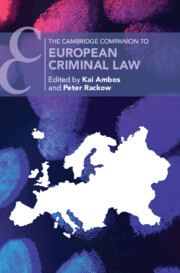Book contents
- The Cambridge Companion to European Criminal Law
- Cambridge Companions to Law
- The Cambridge Companion to European Criminal Law
- Copyright page
- Contents
- Notes on Contributors
- Preface
- Table of Cases
- Abbreviations
- Part I Foundations of European Criminal Law
- Part II Purposes and Principles
- Part III European Substantive Criminal Law
- Part IV European Criminal Procedure
- Part V Institutions
- 14 Office de Lutte anti-fraude (OLAF)
- 15 Europol
- 16 Eurojust
- 17 A European Public Prosecutor Office to Protect Common Financial Interests
- Part VI Perspectives
- Bibliography
- Index
- References
16 - Eurojust
from Part V - Institutions
Published online by Cambridge University Press: 09 February 2023
- The Cambridge Companion to European Criminal Law
- Cambridge Companions to Law
- The Cambridge Companion to European Criminal Law
- Copyright page
- Contents
- Notes on Contributors
- Preface
- Table of Cases
- Abbreviations
- Part I Foundations of European Criminal Law
- Part II Purposes and Principles
- Part III European Substantive Criminal Law
- Part IV European Criminal Procedure
- Part V Institutions
- 14 Office de Lutte anti-fraude (OLAF)
- 15 Europol
- 16 Eurojust
- 17 A European Public Prosecutor Office to Protect Common Financial Interests
- Part VI Perspectives
- Bibliography
- Index
- References
Summary
In 1999, the Tampere European Council agreed that a Unit called Eurojust should be set up to reinforce the fight against serious organised crime. Following that statement, and after a brief period working as a provisional judicial cooperation unit, Eurojust was definitively established through a Council Decision in 2002 as a Union body with legal personality. The Lisbon Treaty called for a strengthened role of Eurojust, which has led to the adoption of Regulation (EU) 2018/1727 on the European Union Agency for Criminal Justice Cooperation. This new legal framework for Eurojust and its national members, applicable from 12 December 2019, has adapted the agency structure to the post-Lisbon scenario, introducing new features and enhancements that must be regarded as positive from the European dimension perspective. It also considers the judicial nature of their operational functions and the need to improve mutual trust between judicial authorities, strengthening the primacy of the rule of law within the Area of Freedom, Security, and Justice. More than twenty years after the first mentioning of Eurojust at the Tampere summit, and when the new Eurojust Regulation is already in force, this chapter combines both academic and operational approaches to offer the reader an updated, comprehensive view of the mission, added value, and extensive possibilities offered by this unique European Union agency.
Keywords
- Type
- Chapter
- Information
- The Cambridge Companion to European Criminal Law , pp. 387 - 412Publisher: Cambridge University PressPrint publication year: 2023

